
With the dramatic developments out of Sudan during the last several days, the reaction from the Obama administration has been notably restrained. Secretary of State Hillary Clinton said that if President Bashir believed he was wrongly accused, he could "have his day in court." When asked about the expulsion of major NGOs from Darfur, the State Department spokesman indicated that a “number of countries are trying to convince the Sudanese Government to reconsider this action…both on the ground and in New York.”
The fact that the administration’s public response has not been more forceful is not necessarily a problem in and of itself: if the administration has a clear strategy and is effectively driving multilateral diplomacy toward that strategy behind the scenes. U.S. policy toward Sudan in the past has too often been heavy on rhetoric and light on action; so here is hoping the current situation represents a reversal of that trend.
However, if the Obama team doesn’t have a clear direction in mind, it will be very difficult to forge a clear approach either at U.N. headquarters or with some smaller grouping of like-minded European allies.
I did think it was particularly noteworthy that General Tony McPeak authored a piece in the Post yesterday calling for the imposition of a no-fly zone. As he argues:
Air power plays a central role in Bashir’s military strategy, so establishing a no-fly zone remains the most promising initiative to halt the atrocities in Darfur… As a practical matter, imposing control over Sudanese airspace must involve NATO and European Union allies, in particular France, which has a suitable airfield at Abeche, in eastern Chad. Allied air forces could and should provide much of the force structure, principally fighter aircraft, but a U.S. contribution — especially of aerial refuelers and command-and-control aircraft — would be essential. About a squadron of each type of aircraft would be more than enough to end the impunity Sudanese military aviation now enjoys… Effective military action in the form of a no-fly zone would not preclude a political resolution, as some suggest, but in fact would make diplomacy more effective by reducing Bashir’s options.
McPeak is not one to speak lightly on this topic. He served as Air Force chief of staff from 1990 to 1994 and, perhaps even more significantly, he co-chaired Obama’s presidential campaign. It is difficult to imagine he would pen such a piece without some advance conversation with Obama’s team.

